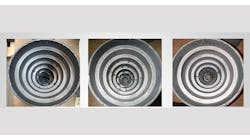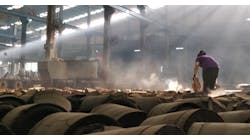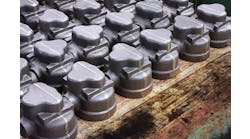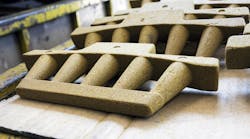Q: Studying our foundry’s core and mold scrap records, I noticed that the frequency of such incidents begins to increase in the spring, peaks during mid-summer, declines during the fall, and reaches bottom throughout the winter. I have looked at all of our procedures and have followed-up with employees working in these areas. However, I still can’t put my finger on what is actually happening. Where should I look next?
A: I suggest that you start looking at those areas that impact the quality of your plant air and the humidity levels within the work environment.
The worst times for core and mold production in the foundry environment are the transition periods between spring and summer, and between summer and fall. Warm air contains much more moisture than cold air and the levels of moisture in that air can have a significant impact on those processes. For example many no-bake processes take longer to strip, shell cores suddenly suffer from peel-back, cold box cores become weaker, and storage of cores and molds made with inorganic binder systems becomes problematic. All of these effects occur because the moisture capacity of the air has undergone a dramatic change.
The subject of compressed air and the effects of humidity is a complex one. To understand better and control the processes dependent on air and the working environment, one first must understand some basic terms and principles. From there a fundamental understanding of why seasonal changes and increased amounts of moisture in the air can have such a dramatic impact on cores, molds, and corresponding scrap rates can be obtained.
Moisture capacity is the amount of moisture air can hold at a specific temperature. Air always will hold as much moisture as possible at any given temperature. Warm air will contain much more moisture than cold air. For example, air at 80°F has four times the moisture capacity than air at 40°F. Relative humidity is a percent value identifying the amount of moisture present in the air based in its temperature. Dew point is the temperature at which the moisture present in the air begins to transform from a vapor to a liquid. Condensation is the process of water molecules transforming from a vapor stage into a liquid. The effect of temperature on moisture-saturated air is especially important to the understanding of the core room and mold line problems caused by weather changes. This can be shown in the following example.
Summer air at elevated temperatures has a high moisture capacity. The relative humidity during normal summer days can be quite high and on regular occasions exceed 90%RH. When summer air begins to cool in the evening and overnight, the dew point of that air is easily reached. A casual observer will note the formation of dew on the grass and the formation of water on building structures at this time. This is the point at which condensation occurs. The effect is most pronounced when there are sudden increases in weather temperature and the presence of high humidity on rainy, muggy days.
The biggest mistakes that a foundry man can make at this time are: a) to believe that your facility’s compressed air dryers are maintained and capable of providing the dry the air used in core-making processes; and, b) to believe that your moldmaking procedures are static and do not require any adjustments based on the conditions.
The first thing to do is to consult with you facility engineering and maintenance teams. They can provide support in terms of analyzing the situation to determine if the plant’s main compressed-air dryer is functioning at peak capacity. They also can assist in evaluating the satellite regenerative dryers used to deliver dry air to your coremaking processes. Also, it would make sense to reach out to the supplier of binders and catalysts used for moldmaking. The technical service that they can provide will allow you to make adjustments with respect to the binder types, catalyst types, and amounts being used.
The bottom line is that that insights learned from these expert sources can help you make the adjustments necessary to keep your processes under control during these difficult times of the year.
Join the Conversation. Email Your Questions for ASK Chemicals Share your insights, opinions, and elaborate on the questions and the experts' answer(s). You must be logged in to the website in order to post your comments.









